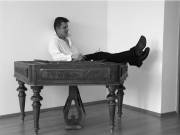 In this show you will hear about situations in which music played an important role connecting people from different cultures, to overcome language barriers or to express feelings for which words would not be adequate.
In this show you will hear about situations in which music played an important role connecting people from different cultures, to overcome language barriers or to express feelings for which words would not be adequate.
absolutely universal
Anne Fox our co-host from Denmark, tells us why music is often so helpful when other languages fail. Music is often seen as a universal language, however, in her experience this is not always the case…
absolutely international
In the second part of the show we will look into International Festivals which have become more and more popular over the last years. During those festivals tens or hundreds of thousands of young people from all over the world sing, dance and live together internationally for a few days. The Sziget Festival in Hungary is a special one, because it is held on an island in Budapest, so the “absolutely international islanders” literally live in the heart of the capital city. Michael Darde, a French student, tells us how he saw it as a tourist and Agnes Dús from Hungary shares her experiences about taking part as a local.
absolutely colorful
In Cologne on the Rhine foreigners from 20 different countries have been singing together in a choir, called “Colors of Cologne”, for the last eight years. Most of the participants report that they joined the choir in order to integrate better in their new environment and to make friends faster. We will also listen to their music!
absolutely spontaneous
Sarah is a student for whom music has a special importance in her life: she plays the piano and writes her own songs. Music helped her make friends more easily, especially during her stay in the US, and also it is the best way for her to express her feelings.
absolutely together
In the last part of the show Emma Cuevas Saunders, a Spanish student, tells us about how singing helped her integrate into the group in a school summer camp in England. She experienced that when words are not enough music comes in and becomes an alternative kind of language.
Our co-host today is Agnes Dús from Budapest in Hungary, student of the Corvinus University of Budapest.
The next show will be coming to you on the 14 December from Anne Fox in Denmark.
So long…stay tuned!
The host of this show is: Dr. Laurent Borgmann
Co-host: Agnes Dús
Editor: Mathias Knops






 In this show we talk to some of the people who attended the
In this show we talk to some of the people who attended the  Absolutely Yours: Thanks to Anastasia Pryanikova for her kind comments about our show. Check out Anastasia’s
Absolutely Yours: Thanks to Anastasia Pryanikova for her kind comments about our show. Check out Anastasia’s  Absolutely National
Absolutely National